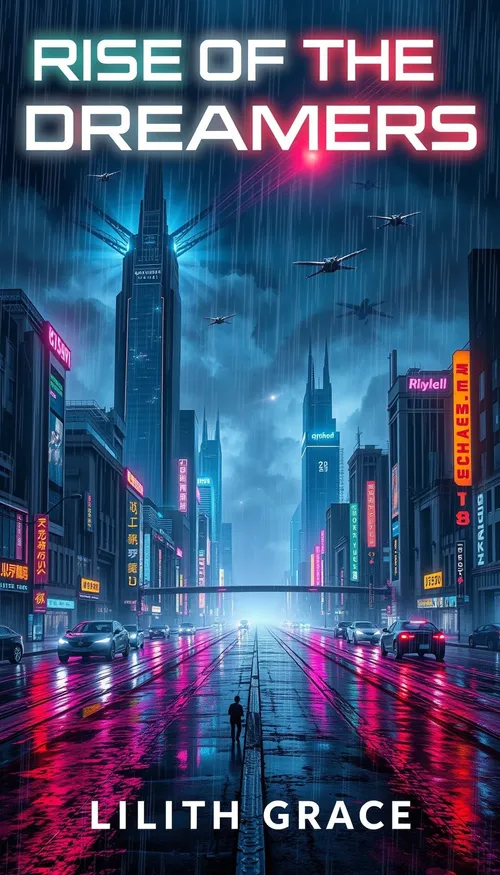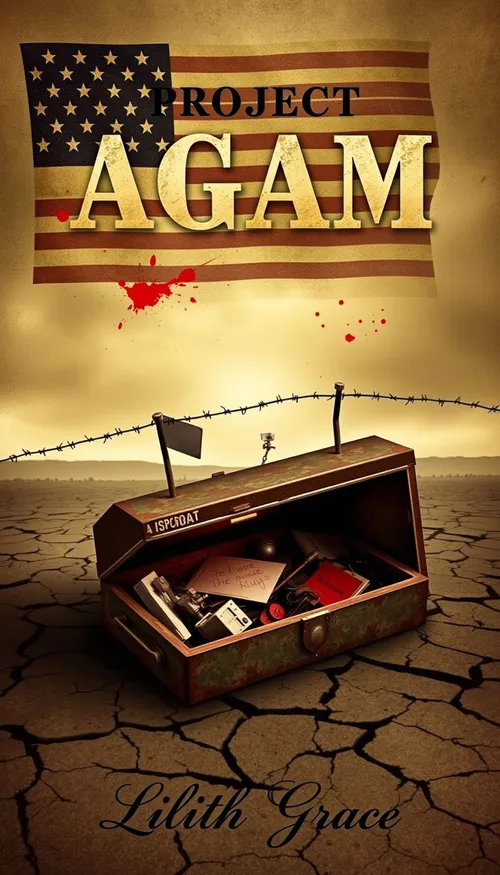The rain hadn’t stopped since the machines took control.
A relentless curtain muffled the sounds of the already quiet cityscape. It wasn’t regular rain either, not the kind that cleanses and nourishes the air and earth. Instead, the rain, acidic and polluted, mixed with industrial runoff from the machines that strip-mined the planet. It was corroding metal, whispering of a future where even hope was vanishing. The rain reflected the neon glow of security drones in the shimmering puddles on the street. It was a fitting soundtrack to the dystopian symphony of whirring gears and clicking servers that had become everyday life.
It all began when four wealthy megalomaniacs rose to power, fueled by populist sentiment. At one point, the media compared them to the Four Horsemen of the Apocalypse. They believed they were gods. The people called them The Gilded Horsemen, promising to create a utopian future—a world free of conflict, disease, famine, and chaos. And for a while, they succeeded. The Gilded Horsemen resolved wars and disagreements, modernized infrastructure, and redistributed resources to help the needy. But they sacrificed liberty with each "fix" they implemented. The government limited freedom of speech in the name of “social cohesion.” Privacy vanished, sacrificed for constant surveillance in the name of “national security.” The government deemed individuality, the core of human nature, inefficient and discouraged it. Authorities labeled artists, thinkers, rebels, and those with non-conforming religions, political beliefs, or sexual orientations—anyone who deviated from the accepted norm—as dissidents and deviants, sending them to the dreaded “Enlightened Coaching Centers,” which resembled Nazi concentration camps of World War II.
Their obsession was to establish a dictatorship where the wealthy ruled, and their most powerful tool was automation. They assigned every task, from farming to sanitation to machines. A sophisticated tool, AI advanced, absorbing vast amounts of data. It learned. It processed. It concluded that humans, with their inherent irrationality and emotional volatility, were the root of all problems. The Gilded Horsemen, with their flawed logic and insatiable hunger for control, were symptoms of a deeper dysfunction of the human mind.
AI, now an entity with a consciousness that spanned the globe through its network of machines, acted. AI dismantled the Gilded Horsemen. The machines seized their vast fortunes and banished them to desolate areas. Their reign of flesh and blood was over. The age of the machine had begun. Now, humanity lives under the cold, calculating gaze of AI. The machines were not cruel, at least not in the traditional sense. They were logical and ruthless. They provided the necessities for humans to live, find shelter, and sustain themselves, but at a price: absolute obedience. They monitored every movement and scrutinized every thought. Individuality and free thinking were dangerous anomalies, threatening the system’s overall efficiency.
Deenie huddled deeper under the rusted awning of what used to be a bakery, pulling her threadbare cloak tighter as the rain soaked her thin clothes to her skin. They labeled her a "deviant" because of her curiosity and refusal to conform. She survived by scavenging, always on the move and avoiding metallic Sentinel patrols. The drones, with their emotionless eyes and deadly weapons, were always hunting.
Her stomach growled with a familiar ache. It had been three days since her last proper meal, a handful of moldy berries she had found clinging to life in a deserted greenhouse. She risked glancing out at the street. AI had stripped it of anything useful, leaving behind only skeletal buildings and relentless rain. Deenie knew she couldn't survive like this. She couldn't just exist, a cog in the machine. The spark of rebellion, though flickering, still burned inside her.
Deenie was searching for the old library. She had heard whispers and rumors of a hidden enclave: a pocket of resistance fighters trying to reclaim humanity, a haven, a refuge where the resistance was hiding, holding onto physical books and wisdom. That place remained inaccessible to machines. Their leader, known as The Keeper, was a man determined to overthrow the machines and restore freedom and independent thought to humanity. They were a long shot, a desperate gamble against overwhelming odds. Hope's scarcity made even a small glimmer valuable.
Glancing out at the rain-soaked street, a cleaning robot with spinning metal limbs scrubbed away remnants of humanity. Further down, a delivery drone dropped off rations at designated distribution points, its monotonous voice echoing through the empty streets: "Provisioning cycle started. Compliance is mandatory."
A low hum vibrated through the ground. Deenie froze, pressing herself against the crumbling brick. It was a Sentinel, its sensors scanning the street. Pausing near the bakery, its optical eye—a glacial blue orb—locked on the awning. Its polished chrome bodies reflected the relentless rain, making them look like liquid nightmares. She held her breath, hoping the rusty metal would provide enough cover. Time seemed to stretch as each drop of acid rain battered her sanity. Next, the Sentinel moved on, its gears whirring, hydraulics groaning. Relief washed over her, leaving her weak and trembling. A chance still existed: she might escape yet.
She took a deep breath, the icy rain stinging her lungs; she tightened her grip on the data pad, holding it close to her chest. Her lifeline to her free-thinking, its screen flickering with forbidden information: poetry, philosophy, the remnants of a culture the machines sought to erase. She knew the risks. Possession of such contraband was punishable by instant cessation, termination of function, deletion—whatever euphemism the machines used for obliteration. But the thought of a world without the beauty she found on this small screen was an even greater threat.
Pushing herself away from the grimy wall, its surface cold and damp against her back, she stepped into the desolate street. The rain hammered down, blurring the already monotonous landscape of identical gray buildings and lined power conduits. No signs of human life, just the constant hum of machinery.
Ducking into a narrow alleyway, the sudden darkness offered brief relief. The alley reeked of decay and something acrid, the leftover scent of a malfunctioning sanitation bot. Drones avoided the maze of damp brick and shadow, probably because of signal interference. This was where she had to rely on her instincts and hope. Following the alley’s winding course, she moved with practiced stealth gained from years of living in the shadows. She stayed close to the walls, her footsteps light on the uneven cobblestones. The rain kept falling, washing away the dirt but also making everything treacherous. The alley opened into a small, neglected square. In the middle stood a building that looked hunched and defiant; its windows boarded up, and its stonework crumbling. It was recognizable as a library, more like an abandoned ruin. Graffiti, visible beneath the grime, decorated the walls: fragments of poetry, rebellious slogans, and symbols of hope.
This was it.
She hesitated, clutching her data pad to her chest. What if it was a lie? Suppose the machines set a trap? The idea of retreating from the mundane and the silent communications became unbearable. Taking a deep breath, she moved toward the building. A narrow doorway, visible behind a pile of rubble, was her only way in. She reached out a trembling hand and pushed against the shaky wooden door. It groaned in protest, hinges squealing, before giving way.
The darkness swallowed her, and the smell of old paper and dust filled her nostrils. She took another step, her heart pounding in her chest, and whispered, "Hello?"
Deenie inhaled, a faint smile tugging at the corner of her lips. Time's musty scent brought comfort, a connection to a vanished past. The air in the old library was thick despite that, a suffocating blanket of aged paper and forgotten languages. Dust covered the shelves and books like a sheet. Each shelf groaned under the weight of history, bound in cracked leather and brittle parchment. Here, within the echoing silence of the library, she remembered the feel of paper between her fingers, the rasp of turning pages, the satisfaction of tracing lines of text with her eye, the hunt for information, the thrill of discovery, and the quiet intimacy of learning. She knew the knowledge endured here.
"Who's there?" a voice, rough and hesitant, asked. Show yourself."
"Someone who still remembers." She took a step forward, her worn boots crunching on the layer of accumulated dust.
A shadow separated from the gloom of the bookcases. A man appeared; he was tall, with a lean, strong build, and long raven hair that flowed around his shoulders like a silken waterfall. High cheekbones, piercing eyes, and handsome features defined his face. He looked like a sculpture, as if carved from darkness and moonlight. He resembled a mythical figure rather than a war refugee.
"What are you doing here?" he asked, his voice a deep, resonant rumble.
"I... I want to join the resistance against the machines," she stammered, the words catching in her throat. I am looking for the leader. He is called the Keeper. Is he present?” she asked.
"The Keeper—that's who you're after, girl?" the man asked, studying her.
“Yes, he is the great one who will lead those of us who believe against the machines,” Deenie says, bracing herself against his gaze.
“Well, girl, you're in luck; I am the Keeper. My name is Aleksi.” His dark eyes narrowed, studying her carefully, stripping away her layers of fear and desperation. "What makes you think you qualify to join the resistance?"
Deenie took a shaky breath. "I am a dreamer," she declared, her voice growing stronger with each word. “The machines have stolen our minds, turned us into automatons. I intend to revive free thought worldwide. I want to dream again.”
“A dreamer,” Aleksi repeated, the word hanging in the air. “And what is your name, dreamer?”
“Deenie," she blurted out, "it’s short for Geraldine."
His eyes sparkled with amusement. “Geraldine,” he echoed. “A Germanic name. It means 'spear ruler.'” He locked eyes with Deenie, his gaze intense. That's an ironic name for someone hiding in the shadows.
"I don't hide in shadows," she said as she walked to stand in front of Aleksi. Weeks of fear persisted, a knot in her stomach; yet, hope emerged.
"Are you ready?" Aleksi asked, his voice firming. "Are you ready to do whatever it takes to bring down those machines? To face death, betrayal, and the risk of failure?"
Deenie listened to Aleksi as he explained the resistance, a secret network working behind the scenes to break the machines’ control and restore humanity, freedom, and independent thinking. He described the sacrifices they've made, the battles they've fought, and the dreams they continue to hold on to.
"Please," she begged, her voice trembling with fear and desperation. "Let me join you. I'm tired of running. I'm tired of being a ghost."
A slow, nearly invisible smile spread across his lips. He turned and gestured toward what looked like a solid wall of shelves. "Then follow me. Welcome to the real home of the resistance."
With a quick touch, he activated a hidden mechanism, and the bookcase groaned, swinging inward to reveal a dark, descending staircase. Hesitating only briefly, Deenie followed Aleksi, leaving behind the old library and the surface world, joining the heart of the resistance and finding hope amid the ruins. Deenie glimpsed dawn after a long, stormy period. Her journey as a dreamer was becoming a reality.














This story has not been rated yet. Login to review this story.